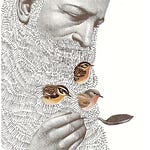“It’s like a gut punch. It’s not just like we lost a war. We ran away. And we don’t run away from a fight. We don’t surrender….who in the world is ever going to trust us again?” — Ret. Army Colonel Sean Seibert
NOTE: The audio is interrupted around the 5-10 minute mark for a few minutes. We think this is an issue with Substack. The full podcast without interruption is available on Spotify, iTunes, and SoundCloud.
Ret. Army Colonel Sean Seibert is part of the digital Dunkirk. He reflects on his time in Afghanistan and the crisis of another failed war.
Seibert is a retired Army Colonel, and one of the hundreds of veterans launching a “digital Dunkirk” — a remote humanitarian evacuation of thousands of Afghans ranging who share our values and are at risk under a Taliban regime.
Over the next hour, we discuss what a digital Dunkirk looks like and what it takes to get people out. We cover why there is no federal exit plan in place for Afghans and how its churned the thoughts and beliefs of the veteran community. Along the way, he shares what it takes to cultivate belonging in a foreign culture, what the next generation of military and civilian leadership needs to look like, and how we can find our commonality as a human tribe.
“It’s like a gut punch. It’s not just like we lost a war. We ran away. And we don’t run away from a fight. We don’t surrender….who in the world is ever going to trust us again?” — Ret. Army Colonel Sean Seibert
This is the inaugural podcast transitioning from a solo platform to The Foundation for Human Belonging, a 501(c)(3) that looks at the arc of human belonging. Welcome to the chorus of voices as we move beyond faith in an ideology, and toward faith in the promise of humanity. That's the future. A future beyond splintered identities dwarfing the vastness of human belonging.
The Foundation for Human Belonging uses storytelling to educate on extremism and advocate for our shared humanity. Stories are the most human thing about us and if we can understand our crisis at this point using a framework of stories, then we can perhaps endeavor to understand our world today and our place in it — as well as learn the skills to build the world we want, so that we don’t have to go the route of other groups of people who have felt that in times of extreme stress and duress the only way to survive was to become more extreme.














Share this post